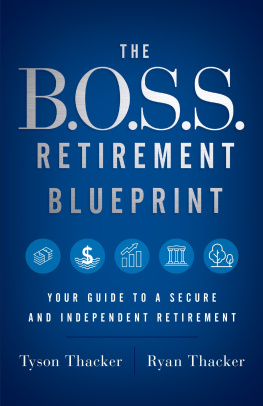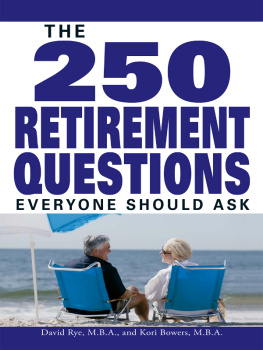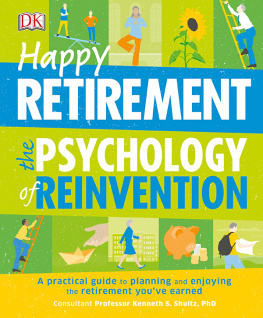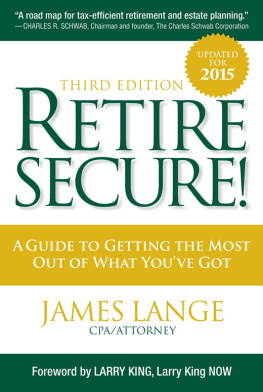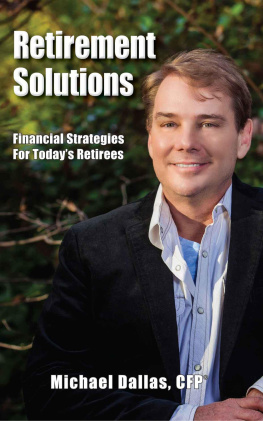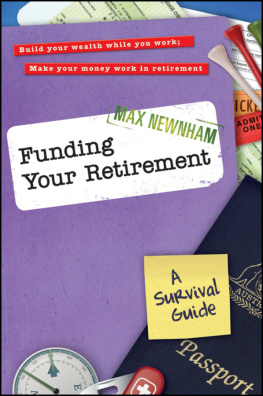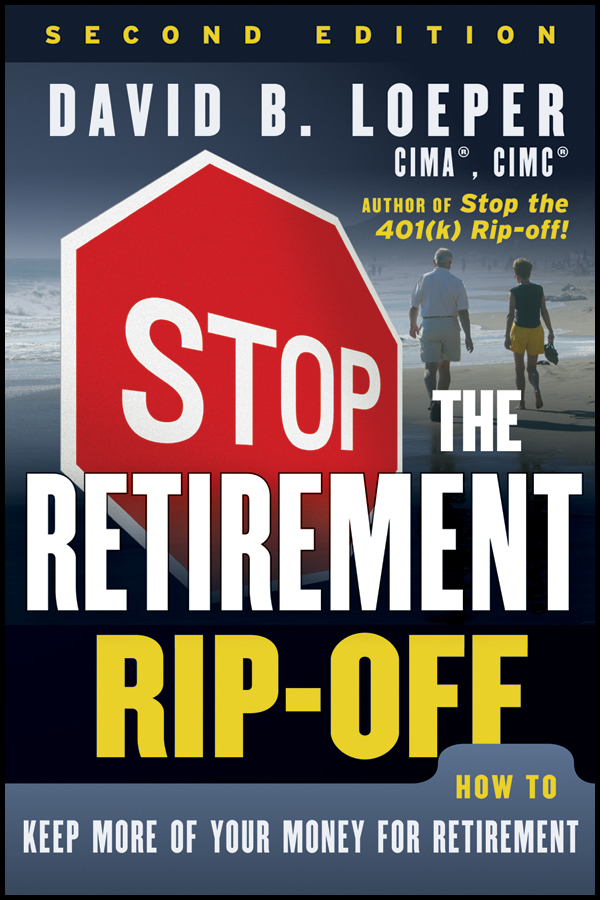Contents

Praise for Stop the Retirement Rip-off
401(k) plans are costly, inefficient clunkers. Fortunately, there is a way out, and Loepers book provides us a great map.
Evan Cooper, Senior Managing Editor of Investment News
If you want to know whats lurking inside of your 401(k), read this book.
John F. Wasik, author of The Merchant of Power and Bloomberg News columnist
Loepers new book shows plan participants how to actually do something about these [401(k)] costs.
W. Scott Simon, J.D., CFP, AIFA, author of The Prudent Investor Act: A Guide to Understanding
This book should spur an entire new industry of 401(k) police... This is just too important an issue to be ignored.
Len Reinhart, Former President of Lockwood Advisors (an affiliate of Pershing) and Past President of Smith Barney Consulting Group
Copyright 2012 by Financeware, Inc. All rights reserved.
The first edition of this book titled, Stop the Retirement Rip-off: How to Avoid Hidden Fees and Keep More of Your Money , was published in 2009 by John Wiley & Sons, Inc., Hoboken, New Jersey.
Published by John Wiley & Sons, Inc., Hoboken, New Jersey.
Published simultaneously in Canada.
No part of this publication may be reproduced, stored in a retrieval system, or transmitted in any form or by any means, electronic, mechanical, photocopying, recording, scanning, or otherwise, except as permitted under Section 107 or 108 of the 1976 United States Copyright Act, without either the prior written permission of the Publisher, or authorization through payment of the appropriate per-copy fee to the Copyright Clearance Center, Inc., 222 Rosewood Drive, Danvers, MA 01923, (978) 750-8400, fax (978) 646-8600, or on the Web at www.copyright.com . Requests to the Publisher for permission should be addressed to the Permissions Department, John Wiley & Sons, Inc., 111 River Street, Hoboken, NJ 07030, (201) 748-6011, fax (201) 748-6008, or online at www.wiley.com/go/permissions .
Limit of Liability/Disclaimer of Warranty: While the publisher and author have used their best efforts in preparing this book, they make no representations or warranties with respect to the accuracy or completeness of the contents of this book and specifically disclaim any implied warranties of merchantability or fitness for a particular purpose. No warranty may be created or extended by sales representatives or written sales materials. The advice and strategies contained herein may not be suitable for your situation. You should consult with a professional where appropriate. Neither the publisher nor author shall be liable for any loss of profit or any other commercial damages, including but not limited to special, incidental, consequential, or other damages.
For general information on our other products and services or for technical support, please contact our Customer Care Department within the United States at (800) 762-2974, outside the United States at (317) 572-3993, or fax (317) 572-4002.
Wiley also publishes its books in a variety of electronic formats. Some content that appears in print may not be available in electronic books. For more information about Wiley products, visit our web site at www.wiley.com .
Library of Congress Cataloging-in-Publication Data:
Loeper, David B.
Stop the retirement rip-off : how to avoid hidden fees and keep more of your money / David B. Loeper. 2nd ed.
p. cm.
Includes index.
ISBN 978-1-118-13304-0 (pbk.); ISBN 978-1-118-17784-6 (ebk); ISBN 978-1-118-17786-0 (ebk); ISBN 978-1-118-17785-3 (ebk)
1. PensionsUnited States. 2. Banks and bankingService chargesUnited States. I. Title.
HD7125.L59 2011
332.6dc23
2011038885
This book is dedicated to my children, Brian and Megan. I am incredibly proud of both of you for the unique personal qualities you possess. Remember, it is your life and to be happy you need to fearlessly pursue your passions. You have but one life, and it is up to you to make the most of it. Dont let anyone push you around or tell you how you should live YOUR life!
I swear by my life, and my love of it, that I will never live for the sake of another man, nor ask another to live for the sake of mine.
Ayn Rand, Atlas Shrugged
Preface
Over the last 20 years or so, there has been a major shift in the retirement plans that companies offer their employees. Your parents were probably covered by a pension plan (specifically, a defined-benefit pension plan) where the company guaranteed a certain fixed lifetime income (the defined benefit). Upon retirement, this would provide an ongoing retirement paycheck throughout their lives. Such plans have become less and less popular among employers because the guaranteed benefits cost the company a lot of money.
Employers have increasingly switched to 401(k), 457, and 403(b) plans (collectively known as participant-directed retirement plans), which transfer the risk of the ultimate retirement benefit (along with most of the other expenses) to employees. Such plans have been around for quite some time but were initially not very popular. Employers loved these participant-directed plans, though, because instead of the employer guaranteeing a specific benefit (and paying for 100 percent of the cost of the benefit as in many older pension plans), the employer could move both the costs and risk to its employees. Despite this, these types of retirement plans gained in popularity among employees as well, influenced partially by the high market returns some of the mutual funds experienced. Also, many companies that previously could not have afforded the cost or risk of a traditional pension plan could afford to offer a participant-directed retirement plan, since the employees carried the burden of most expenses and all of the risk. Thus, many small companies that never would have had any retirement plan at all started these retirement plans in an attempt to compete with larger employers benefit plans. Even though the employee was assuming 100 percent of the investment risk, 100 percent of the retirement benefit risk, and, in many cases, most of the cost in the form of annual contributions (most participant-directed retirement plans have some matching contribution by the employer), the flexibility of these plans ultimately made them attractive to some employees.
There is nothing wrong with an employer trying to reduce its share of the costs of retirement benefits by moving to these plans. After all, if your employer doesnt pay attention to its costs, it wont be in business for long! Such retirement benefit plans are offered by employers in order to be competitive in recruiting talent and having employees perceive a positive benefit to encourage them to stay with the company. Therefore, your employers goal is to offer the greatest benefit as perceived by employees and recruits at the lowest cost to the company. This is Economics 101. A retirement plan with participant direction and funding (such as 401(k), 403(b), and 457 plans) fits the bill perfectly today, because employees view them in a positive light while generally bearing most of the costs and risks and saving the company a mountain of expenses.
Throughout this book, whenever I use the term 401(k) plan, it is also meant to cover 457 and 403(b) plans as well, even if they are not specifically mentioned. However, if there are differences applicable between these types of plans, they will be highlighted and spelled out for you.
As mentioned, when 401(k) plans first came out, they were not viewed as positively by employees as they are today. (Although the bear market in 2008 through early 2009 has had many participants change that view.) Many large companies were slow to move to 401(k) plans because of the revolt from employees. That might be hard to imagine today when it is expected that a company will offer a 401(k) plan, and such plans are normally viewed as a positive benefit to employees. But back when most employees were covered by pension plans, the companies that attempted to switch to a 401(k) plan often froze the benefits in their existing pension plans and offered employees these new 401(k) plans instead. As you might imagine, these employers experienced a fair number of complaints from their employees. At the time, the existing employees covered by the old pension plan realized that with the new 401(k), they were taking on the investment risk, the benefit risk, and most of the cost and expenses. It seemed like a rip-off when compared to the old pension plan in which the employer carried all of the risks and expense.


